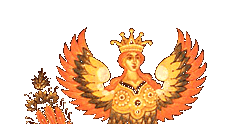Svyatogor was the last of the Elder Heroes, that is to say, of the prehistoric, purely mythical giants of the cycle preceding the Vladimirian. The only songs belonging to this cycle which have come down to us are those relating to Volga and Mikula, Svyatogor, and the "One and Forty Pilgrims," who are thought to be nameless heroes belonging to that epoch. One or two others are slightly mentioned, as will be seen in "Ilya and the Idol," where Ivaniusho is a reprentative of the older race. Svyatogor's name is derived from his dwelling in the Holy Mountains (na svyatyk gorak), but what there Holy Mountains represent on earth is not known. Mythologically considered, they are the clouds. Hilferding found one very good rhapsodist who persisted in using the name Svyatopolk, on the usual ground, that "it was sung so." This suggested to Hilferding that Svyatogor might be identical with the giant of that name from Great Moravia - a legendary hero, and the representative of Slavic might. The Chronicle of Kosma of Prague states that Svyatopolk concealed himself in the mountains, and there died a mysterious death. Svyatopolk also, like Svyatogor, was the only giant hero who did not was against Holy Russia.
The adventure with the pouches is often credited to "Hero Samson," Mikula being replaced by two angels sent by the Lord to rebuke the hero's arrogance.
A boast similar to that of Svyatogor was attributed to Alexander of Macedon in the manuscript legends of him, which reached Russia from Byzantium in very early times.
The "Elder Heroes" make way for the Younger, typified in Olya, as the Titans made way for the Gods in Greek, or the Jotuns for the Asa in Norse mythology. The Younger Heroes superseded the Elder when men became convinced that in the battle constantly waged between light and darkness, summer and winter, light and summer always conquered at last. The distinction between the Elder and Younger Heroes has ceased to exit among the people, who regard them merely as representatives of different kinds of heroic, not divine, forces.
Svyatogor, the giant cloud-mountain, dies, i.e., becomes fettered with cold, and falls into his winter sleep. Popular fancy has likened the action of the frost to bands of iron, upon the frozen, stone-like earth. Svyatogor's huge sword, the lightning, which is spring and summer parts the heavens, prepares during the heavy autumnal storms the iron bands which the cold hand of winter lays upon the cloud.
Svyatogor's father belongs to the same class of easily tricked giants as Polyphemus. Instances, almost exactly similar, of the substitution of iron for the giant to grasp, are to be found in modern Greek and Swedish legends, and in the eleventh book of the Mahabharata. The crystal casket in which the hero carries his wife suggests an incident in one of the tales contained in the Arabian Nights' Entertainment.
|



